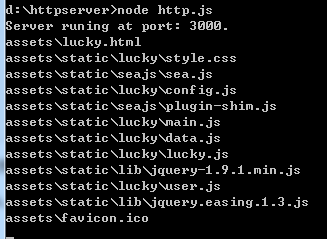nodejs搭建本地http服务器
本文转载自:http://www.cnblogs.com/shawn-xie/archive/2013/06/06/3121173.html
由于不做php相关的东西,懒得装apache,干脆利用nodejs搭建一个本地的服务器用于测试。
nodejs这玩意儿吧,对做前端的介入后端简直就是一把利器。而且目前,nodejs也越来越有商用价值。
nodejs其实是非常底层的,从功能上说,它既是apache也是php。像搭建http服务器这种功能,本来是apache已经封装好的,但nodejs需要我们手动来搭建。其实在实际应用中,我们可以使用现成的框架。但这里,我想手动搭建,也加深一下对http服务器的理解。
我们node执行下面这个文件,我命名为http.js,它将创建一个httpServer并监听3000端口。
var PORT = 3000;
var http = require('http');
var url=require('url');
var fs=require('fs');
var mine=require('./mine').types;
var path=require('path');
var server = http.createServer(function (request, response) {
var pathname = url.parse(request.url).pathname;
var realPath = path.join("assets", pathname);
//console.log(realPath);
var ext = path.extname(realPath);
ext = ext ? ext.slice(1) : 'unknown';
fs.exists(realPath, function (exists) {
if (!exists) {
response.writeHead(404, {
'Content-Type': 'text/plain'
});
response.write("This request URL " + pathname + " was not found on this server.");
response.end();
} else {
fs.readFile(realPath, "binary", function (err, file) {
if (err) {
response.writeHead(500, {
'Content-Type': 'text/plain'
});
response.end(err);
} else {
var contentType = mine[ext] || "text/plain";
response.writeHead(200, {
'Content-Type': contentType
});
response.write(file, "binary");
response.end();
}
});
}
});
});
server.listen(PORT);
console.log("Server runing at port: " + PORT + ".");
上面我们还引入了一个mine.js,这是我自己写的,里面存储的是名值对,用于定义不同后缀的文件所对应的返回方式:
exports.types = {
"css": "text/css",
"gif": "image/gif",
"html": "text/html",
"ico": "image/x-icon",
"jpeg": "image/jpeg",
"jpg": "image/jpeg",
"js": "text/javascript",
"json": "application/json",
"pdf": "application/pdf",
"png": "image/png",
"svg": "image/svg+xml",
"swf": "application/x-shockwave-flash",
"tiff": "image/tiff",
"txt": "text/plain",
"wav": "audio/x-wav",
"wma": "audio/x-ms-wma",
"wmv": "video/x-ms-wmv",
"xml": "text/xml"
};
fs模块是用于读取文件的,提供读取文件的方法,其实仔细研究文档会发现,它有同步和异步两种读取方式。fs.exists这个方法网上很多文章写作path.exists,,现在推荐写作fs.exists这个方法。否则会报警:

需要注意的是,不仅浏览器访问html文件会形成一次访问,里面链接的js,css等外部文件也会分别形成一次http访问。所以,http.createServer的回调其实是在一次页面访问中执行了多次的。我们console.log(realPath)一下就可以看到:

这里并没有加入默认访问index.html的功能,所以访问地址要写全http://127.0.0.1:3000/index.html
如果根目录默认访问index.html的话可以用下面这段代码:
if (pathName.charAt(pathName.length - 1) == "/") { //如果访问目录 pathName += "index.html"; //指定为默认网页 }
另外,如果想提供下载文件功能可以使其他扩展名的文件使用"application/octet-stream"来做返回类型。
